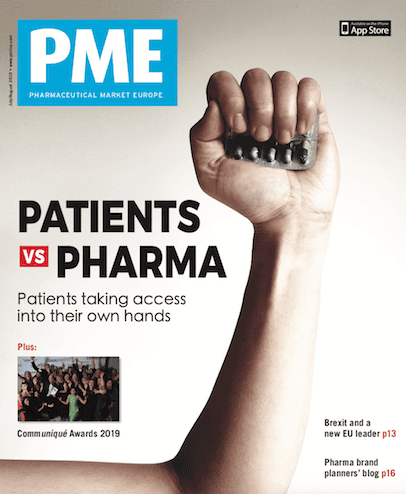
Today, patient organisations and charities have become well established stakeholders in healthcare, and work closely with governments and healthcare providers, and engage in dialogue and partnership with the pharma industry.
But a new generation of patient activists says relations between regulators, governments and pharma have become far too cosy, and that big charities are failing to hold them to account, especially on issues such as pricing and access.
Diarmaid McDonald is lead organiser of Just Treatment, a UK-based patient activist group which is challenging the government to take whatever steps necessary to ensure access to new medicines at what they say is a more reasonable price.

Diarmaid McDonald, lead organiser, Just Treatment
The message is stark: if pharma and governments will not or cannot come to an agreement, we the patients will have to get access ourselves.
This includes overriding pharma patents – something the group is advocating in relation to three drugs – Vertex’s cystic fibrosis treatment Orkambi, Pfizer’s breast cancer treatment Ibrance and Roche’s breast cancer drug Perjeta. At the same time, Just Treatment is part of a growing movement that is seeking greater data sharing between governments on drug prices, in order to give individual nations more leverage in negotiations with the industry.
“In the face of high prices, western governments will increasingly need to use their legal flexibility and demand transparency from pharmaceutical companies,” said McDonald.
HIV/AIDS and radical patient activists
The most energised and even radical patient activism has tended to occur in rare, life- threatening diseases – the most influential being the HIV/AIDS movement of the late 1980s and 1990s.
This saw members of the gay and lesbian community mobilise themselves when they saw their friends and partners dying from what was then a mysterious, fatal and deeply stigmatised disease. This movement spawned the AIDS Coalition to Unleash Power (ACT UP) and later the Treatment Action Group (TAG).
The movement proved to be hugely influential, and by the early 1990s its activism had spurred the FDA to introduce ‘accelerated approval’ that allowed experimental yet promising drugs to be made available to people with HIV/AIDS more quickly. The FDA hadn’t been willing to override its existing safeguards until the activists took direct action.
This included campaigners storming the regulator’s office for a day, and the importation of unlicensed treatments by groups such as The Dallas Buyers’ Club, made famous in the 2013 film starring Matthew McConaughey.
Challenging the consensus
Fast forward from Texas in the mid-1980s to England in 2019 and we see a group of patients take inspiration from this direct action, driven by desperation to source what could also be life- saving drugs: the Cystic Fibrosis Buyers’ Club.
Set up in May this year, largely by parents of children with cystic fibrosis, the Buyers’ Club aims to import generic versions of Orkambi from abroad and bypass Vertex’s European patent on the drug. Orkambi is currently out of reach because of a three-year-long dispute between manufacturer Vertex and NHS England, which shows little sign of ending any time soon.
Dairmaid McDonald and the Just Treatment team are supporting the Cystic Fibrosis Buyers’ Club to make the goal a reality, and have approached the task with determination and formidable organisation and attention to detail.
While the main CF charity, the Cystic Fibrosis Trust, has sought to maintain dialogue with the government and Vertex, many campaigners, parents and CF patients have grown disillusioned with the impasse, which they see as all talk and no action.
Just Treatment is also urging the UK government to override Vertex’s patent via compulsory licensing or Crown Use Licence. However, it became clear to many parents of children with CF that this process would still take years of legal wrangling. Instead, they identified a legal loophole which allows them to privately import medicines from abroad – including cheap copies of Orkambi.
“The Buyers’ Club has grown from an amazing online community of patients and family members who have been campaigning tirelessly for years for access to Orkambi at a fair price,” said Dairmaid.
While many activists don’t want to apportion blame for such disputes, McDonald is clear that it is a Vertex obsession with profit that is to blame.
McDonald said: “When the government fails to tackle the problem of drug company profiteering it falls to those affected to solve the problem themselves, as the CF Buyers’ Club is doing now.”
So what does Vertex say about these latest developments? Company spokespeople wouldn’t comment directly on the Buyers’ Club, but said: ”We understand patients’ frustration and share their urgency to find a solution.” The company says it remains committed to the “ongoing negotiations” and said its “intensive work continues on a daily basis”.
It also stressed that it is continuing to provide free medicines to the most seriously ill patients through its compassionate use programme, which has helped 1,000 patients in the UK so far. Yet as these protracted talks are confidential and not open to them, patient representatives aren’t prepared to wait any longer and will “use every tool in the box to get fair access to these drugs”, said McDonald.
Meticulous preparations
The supply of the generic drug comes from Argentinian pharma company Gador, whose Lucaftor is a copy of Vertex’s Orkambi. Because Vertex holds no patent in Argentina, Gador is able to manufacture its version of the drug, which in turn means that patients in the UK can access the drug via this route. By pooling their resources, the Buyers’ Club allows members to use collective buying power to agree a discounted rate on the medicines.
Gador has offered a year’s supply of Lucaftor for £23,000 per patient, with additional discount to £18,000 if the club can get 500 people involved. While this is still a large sum to pay for the drug, it’s a fraction of the £104,000 that Vertex is currently selling the treatment for. However, while it’s an alternative for those affected by cystic fibrosis, it’s by no means the most ideal one.
The Club is made up of highly educated, well-informed individuals who have been able to organise themselves effectively and call on expert advice to advise them through the process.
The Buyers’ Club has hit upon a perfectly legal means of importing medicines: UK law allows the buying and importing of medicines into the country if they are for personal use. The Club has also taken great care to independently verify the quality and safety of the imported medicines, paying for NHS-run labs to confirm the bio-equivalence tests run by Gador.
As of early July 2019, McDonald said: “Patients are liaising with their NHS teams and we expect the first imports (of Lucaftor) to happen in the coming weeks.”
Against this kind of direct action, pharma’s argument that breakthrough drugs require big R&D risks and big financial returns and patent protection look out of touch and worse, impotent.
More Patients versus Pharma:




